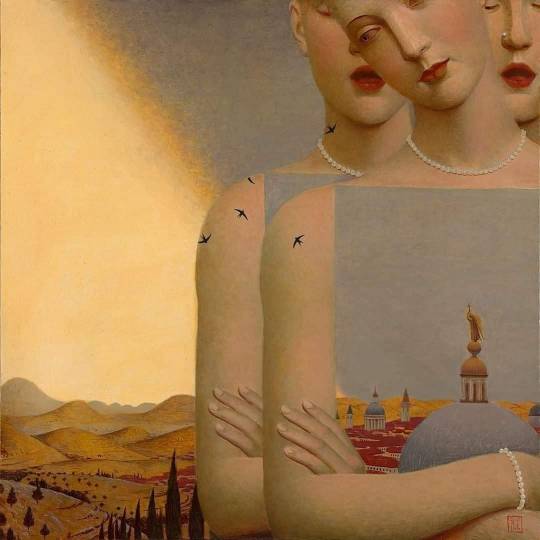#1911-1995 romanian philosopher
Explore tagged Tumblr posts
Text

Andrey Remnev Thunder and Lightening, 2019
唯一能拯救人類的就是愛。 如果許多人最終把這種說法變成了平庸的話,那是因為他們從未真正愛過。
La sola cosa che possa salvare l’uomo è l’amore. E se molti hanno finito per trasformare in banalità questa asserzione, è perché non hanno mai amato veramente.
- Emil Cioran, Al culmine della disperazione /1911-1995 羅馬尼亞旅法哲人,二十世紀懷疑論、虛無主義重要思想家,有羅馬尼亞語及法語��作格言、斷章體哲學著述傳世,以文辭精雅新奇、思想深邃激烈見稱。Romanian philosopher, aphorist and essayist, who published works in both Romanian and French. His work has been noted for its pervasive philosophical pessimism, style, and aphorisms. His works frequently engaged with issues of suffering, decay, and nihilism. In 1937, Cioran moved to the Latin Quarter of Paris, which became his permanent residence, wherein he lived in seclusion with his partner, Simone Boué, until his death in 1995.
11 notes
·
View notes
Text
Emil Cioran: A Philosophical Pessimist
Emil Cioran (8 April 1911 – 20 June 1995) was a Romanian philosopher, aphorist and essayist. His work has been noted for its pervasive philosophical pessimism, frequently engaged with issues of suffering, decay, and nihilism. In 1937, Cioran moved to Paris, where he lived for the rest of his life in seclusion with his partner, Simone Boué, until his death in 1995. Continue reading Emil Cioran: A…

View On WordPress
0 notes
Text
Emil Cioran: A Philosophical Pessimist
Emil Cioran (8 April 1911 – 20 June 1995) was a Romanian philosopher, aphorist and essayist. His work has been noted for its pervasive philosophical pessimism, frequently engaged with issues of suffering, decay, and nihilism. In 1937, Cioran moved to Paris, where he lived for the rest of his life in seclusion with his partner, Simone Boué, until his death in 1995. Continue reading Emil Cioran: A…

View On WordPress
0 notes
Text
“History is irony on the move”
September 2015: Germany emerges as the moral conscience of Europe 70 years after the defeat of Nazism. [It was one of the largest recipients of Syrian refugees, during the Syrian refugee crisis]
Meanwhile, Hungary, which in 1989 precipitated the fall of communism, now hosts a major fascist and antisemitic movement, proclaims its desire to keep Europe Christian.
*Quote above is by Emil Cioran (Romanian philosopher, 1911–1995)
2 notes
·
View notes
Text
Emil Cioran Quotes
Are you interested in famous Emil Cioran quotes? Here is a collection of some of the best quotes by Emil Cioran on the internet.
About Emil Cioran
Emil Cioran (8 April 1911 – 20 June 1995) was a Romanian philosopher and essayist, who published works in both Romanian and French.
Famous Emil Cioran quotes
The desired quotes are awaiting you below. They are available for free.
1
Insomnia is a…
View On WordPress
0 notes
Photo

Emil Cioran (8 April 1911 – 20 June 1995) was a Romanian philosopher and essayist, who published works in both Romanian and French. Cioran was born in Resinár (Rășinari), Szeben County, which was part of Austria-Hungary at the time. His work has been noted for its pervasive philosophical pessimism, and frequently engaged with issues of suffering, decay, and nihilism. Among his best known works are On the Heights of Despair (1934) and The Trouble with Being Born (1973). Cioran's first French book, A Short History of Decay, was awarded the prestigious Rivarol Prize in 1950. The Latin Quarter of Paris was his permanent residence and he lived much of his life in isolation with his partner Simone Boué.
Source: Wikipedia
http://creativecommons.org/licenses/by-sa/3.0/
0 notes
Quote
History is irony on the move
Emil Cioran (Romanian philosopher 1911-1995)
0 notes